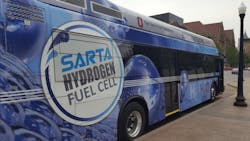CTE and RHFCC publish paper on joint procurement strategies for zero-emission buses
A newly published paper looks at ways to reduce costs associated with zero-emission buses buy scaling up the market. The paper, Procurement Strategies for Reducing Capital Costs of Zero-Emission Buses, was released on Dec. 7 by the Center for Transportation and the Environment (CTE) and the Renewable Hydrogen Fuel Cell Collaborative (RHFCC).
The paper evaluates the challenges associated with procuring zero-emission buses (ZEBs) and how joint procurement strategies can effectively decrease costs in the North American market. With support from the Stark Area Regional Transit Authority (SARTA) through Federal Transit Administration funding, CTE staff authored the paper in partnership with the RHFCC and the Cleveland State University Levin College of Urban Affairs.
As with any emerging technology, capital costs can pose barriers to commercialization. By surveying the current ZEB procurement landscape, this paper defines the challenges of joint procurements including the coordination of funding and bus replacement scheduling and the development of a vehicle specification that serves multiple transit agencies. Alternatives to traditional joint procurement are also discussed, including state purchasing contracts, public-private partnerships and CTE’s 100-Bus Initiative.
“The primary goal of this paper is to figure out how to decrease the price of zero-emission buses,” said Alison Smyth, the paper’s lead author. “We were prompted by efforts in Europe where they have undertaken large joint procurements and used them to increase the volume of purchases to bring down the bus price. We wanted to explore their procurement process and share how this would translate into the American market.”
CTE is uniquely qualified to write this paper because of extensive relationships within the transit industry. Through partnerships with more than 70 transit agencies deploying more than 300 zero-emission buses, CTE has developed relationships with the many different players that support the zero-emission vehicle transition processes. CTE’s relationships are critical to understanding the end-to-end procurement process spanning from challenges faced by bus manufacturers developing specifications for procurement requests to transit agencies seeking to understand and procure complex, emerging technologies.
“Our primary goal is to combat the climate crisis by accelerating the transition to zero-emission vehicles in the U.S.,” said Dan Raudebaugh, CTE executive director. “As the zero-emission market develops, capital costs remain a barrier. By exploring opportunities to drive down prices, we hope operators will be able to deploy clean transportation technologies in larger numbers so we can all enjoy the benefits these buses provide to our climate and communities.”
“SARTA has been able—over the past several years—to demonstrate the operational efficacy of hydrogen fuel cell electric buses,” said Kirt Conrad, CEO of SARTA, a transit agency that operates a fleet of 17 fuel cell electric paratransit and traditional buses in Canton, Ohio, along with the RHFCC. “We have been able to replace our diesel buses on nearly a one-to-one basis, even during cold weather. What needs to be done now is to bring down the cost of fuel cell electric buses. What CTE has done with this study is to identify important pathways forward for that to happen.”
The paper is available free of charge on CTE’s website.
